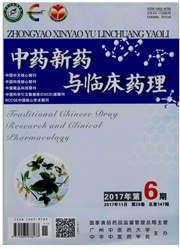

 中文摘要:
中文摘要:
目的探讨白藜芦醇对Hep G2人肝癌细胞DNA拓扑异构酶I(TOP I)的活性的影响及对Hep G2人肝癌细胞生长的抑制作用。方法采用MTT法观察白藜芦醇对Hep G2人肝癌细胞生长的抑制作用及对LO2人正常肝细胞毒性作用,利用琼脂糖凝胶电泳法测定白藜芦醇对TOP I活性的影响,在此基础上,利用分子对接观察白藜芦醇与TOP I的相互作用机制,进一步探讨白藜芦醇对Hep G2人肝癌细胞侵袭及其凋亡蛋白Caspase3活性的影响。结果白藜芦醇对Hep G2人肝癌细胞的生长和转移有抑制作用,半抑制率(IC50)为(9.657±0.93)μmol·L-1,且对LO2人正常肝细胞具有低毒性;琼脂糖凝胶电泳显示白藜芦醇对TOP I活性的有较好的抑制作用;分子模拟结果表明,白藜芦醇能够优先结合到TOP I的活性中心附近,并与催化基团ARG364形成氢键;Caspase 3活性检测结果表明,白藜芦醇能显著提高Hep G2人肝癌细胞中凋亡蛋白Caspase 3活性(P〈0.01)。结论白藜芦醇能够通过对TOP I的活性起到可逆的竞争性抑制作用,而使肿瘤细胞DNA单链解旋的速率降低,最终对诱导了Hep G2人肝癌细胞的凋亡起到重要作用。
 英文摘要:
英文摘要:
Objective To study the effect of resveratrol on the activity of DNA topoisomerase I(TOP I) inHepG2 cells and to investigate its inhibition of HepG2 cells. Methods The inhibitory effect of resveratrol on the growth of HepG2 cell as well as its cytotoxicity on LO2 normal cells were analyzed by MTT method, and its effect on TOP I activity was studied by using the agarose gel electrophoresis method. At the end of the experiment, the effects of resveratrol on HepG2 cell invasion and on Caspase 3 activity of HepG2 cells were investigated. Results Resveratrol could inhibit the growth and transfer of HepG2 cells, with a half inhibition rate (IC50) being (9.657 ±0.93 ) μmol . L-1. Resveratrol had less cytotoxic effect on normal cells. The results of agarose gel eleetrophoresis showed that resveratrol had significant inhibition of TOP I activity. Molecular simulation results showed that resveratrol could bind to the active center of TOP I, and formed hydrogen bonds with the catalytic site ARG364. Caspase 3 activity detection results showed that resveratrol could significantly increase Caspase 3 activity of HepG2 cells (P 〈 0.01 ). Conclusion Resveratrol has inhibitive effect on TOP I activity, and could reduce the unwinding rate of single chain of tumor cell DNA, which plays an important role in inducing the apoptosis of HepG2 cells.
 同期刊论文项目
同期刊论文项目
 同项目期刊论文
同项目期刊论文
 期刊信息
期刊信息
